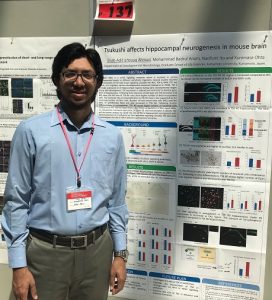
Tsukushi affects hippocampal neurogenesis in mouse brain
Shah Adil Ishtiyaq Ahmad, Mohammad Badrul Anam, Naofumi Ito and Kunimasa Ohta
Department of Developmental Neurobiology, Graduate School of Medical Sciences, Kumamoto University, 1-1-1 Honjo, Kumamoto, Japan.
Name of the academic meeting: 52nd Annual Meeting of Japanese Society of Developmental Biologists, International House, Osaka, Japan (May 14-17, 2019).
Date of presentation: 2019, May 15 and May 16
Type of presentation: Oral and Poster
Oral presentation: OP5-11, May 15, 18:30 – 18:45
Poster presentation: P-137, May 15 (13:30-14:30) and May 16 (14:15-15:15)
Abstract
Tsukushi (TSK) is a small signaling molecule which is involved in various developmental events in different vertebrate organisms. TSK was first reported to be involved in the early development of Chicken by functioning as a BMP antagonist (Ohta et al. 2004). Several following studies reported the interaction of TSK with major signaling cascades like Wnt, TGF-, BMP, FGF and Notch; as it regulates various developmental processes (Ahmad et al. 2018). Hippocampal neurogenesis is regulated by multiple signaling pathways, like Wnt, BMP, Notch, Shh, GABA etc (Goncalves et al. 2016). Since TSK directly interacts with BMP, Wnt and Notch pathways, we decided to investigate the role of TSK in mouse hippocampal neurogenesis. At first, we checked the expression of TSK in mouse hippocampus at different developmental stages. TSK is strongly expressed at hippocampal regions during early developmental stages starting as early as embryonic day 18. Along with the development, TSK expression is reduced and limited to particular regions of brain. In early stages, TSK is expressed in all the hippocampal regions (DG, CA1, CA2 and CA3), while at postnatal day 30, the expression is restricted to only DG region. Following BrdU injection of wild type and TSK knockout (TSK KO) mice, the DG area of TSK KO mice showed higher number of BrdU incorporated cells. The increased rate of cell proliferation in TSK KO mice is also evident by the immunostaining for Ki67. Both these results suggest possible regulatory role of TSK in the maintenance of hippocampal neurogenic niche. We will do further analysis to clarify the role of TSK in hippocampal neurogenesis with special attention to its influence on different signaling cascades. We also want to investigate the role of TSK in behavior and memory formation.
In the meeting, I gave a talk on my work in front of an international audience. The presentation and the question session have definitely boosted my confidence. I received useful comments from many experienced researchers which will help me to guide my future studies. During the poster sessions, I had the opportunity to discuss about my study with many other researchers. I also learnt a lot from other presentations at the meeting. I learnt many new techniques and interesting topics related to my study. I also attended the lectures of many famous scientists which were very inspiring. I thank ‘International Research Core for Stem Cell-based Developmental Medicine’ project for supporting my expenses to attend the meeting.
